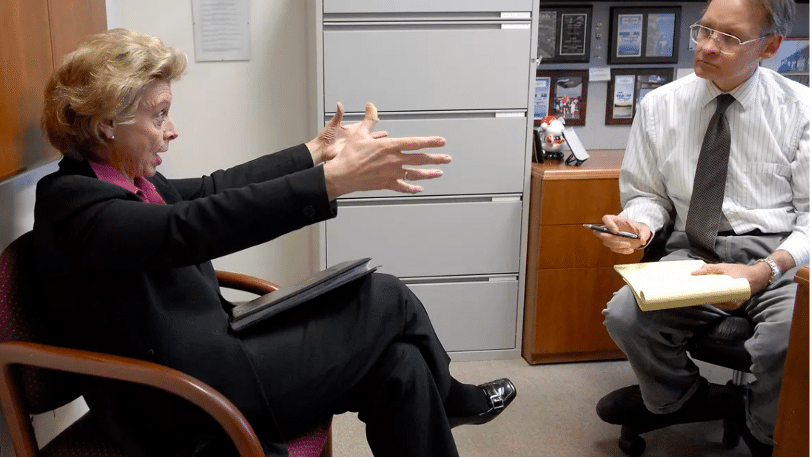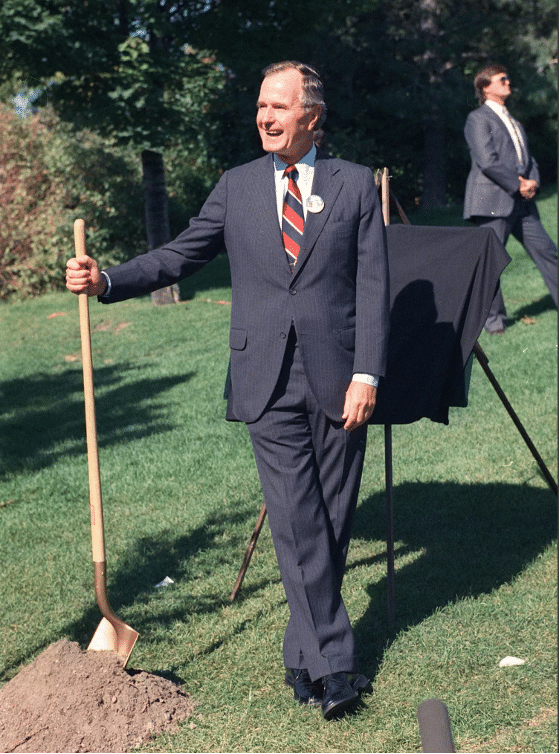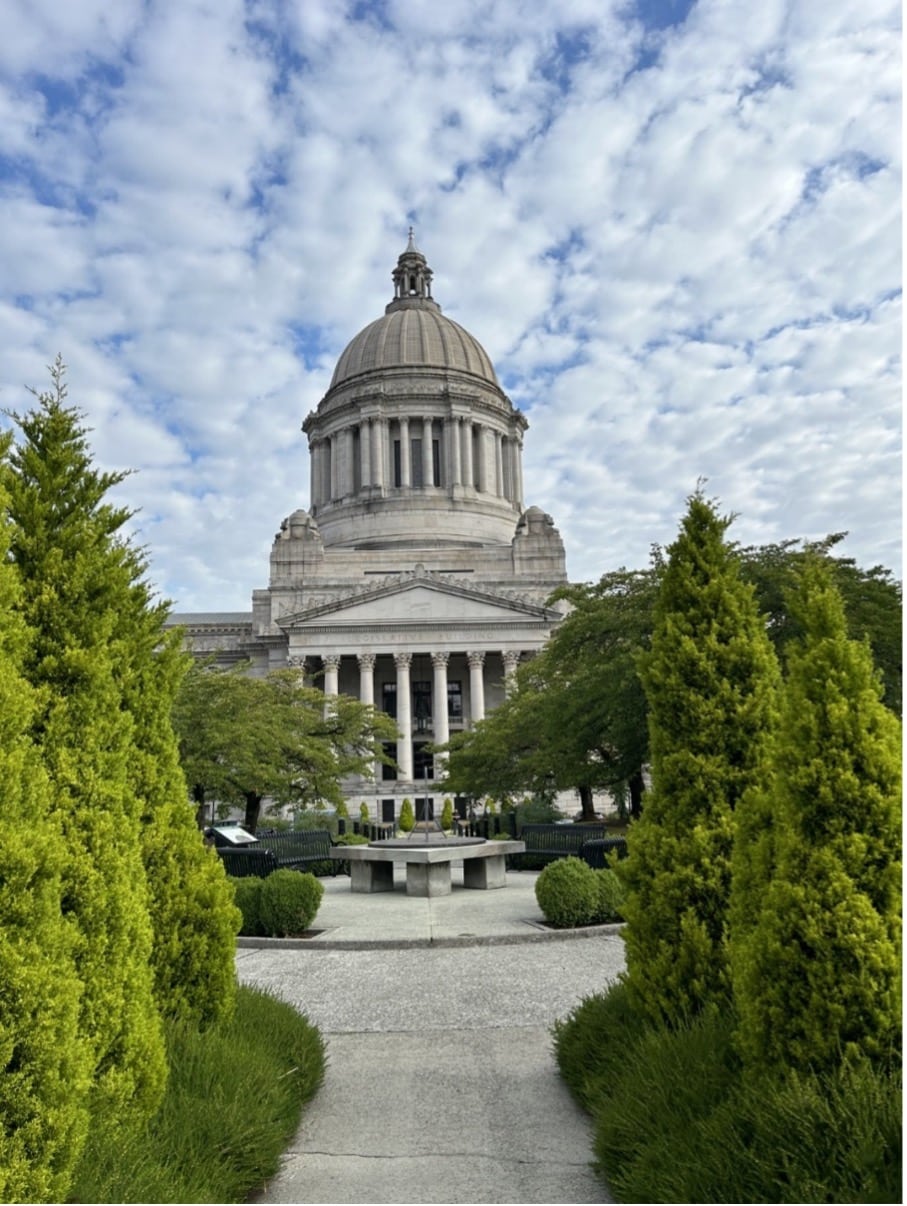Interview with Longtime Spokesman Review Olympia Bureau Chief Jim Camden
 Jim Camden interviews former Governor Christine Gregoire (Photo Courtesy: Spokesman Review)
Jim Camden interviews former Governor Christine Gregoire (Photo Courtesy: Spokesman Review)
Enjoy highlights of my conversation with the Spokesman Review’s longtime Olympia Bureau Chief, Jim Camden…
Why Journalism and Why Spokane?
While attending the “Mizzou” School of Journalism (University of Missouri), Jim dreamed of becoming the next Ernest Hemingway, but realized the odds of hitting it big as a novelist were less than becoming a starving writer, so he opted for journalism.
Jim’s first professional journalist stop was in Lincoln, Nebraska where he worked for five years. There, Jim served as a night copy editor, night police reporter and eventually covered the Nebraska Legislature – which is unique in that it is the only unicameral Legislature in the country (meaning it has only one legislative body).
Early in his career, Jim applied for an open position with the Spokesman Review in its Olympia Bureau. Jim was asked what he knew about Washington state politics and when he responded with information about our state’s then U.S. Senators, he was told it was not possible to report on a state house without knowing the players and its landscape. Fair enough.
Thankfully, the Spokesman Review saw promise in Jim and ultimately hired him in 1981, offering him a nighttime general assignment position. As Jim talked about his professional trajectory, he described jobs and roles (like night policy reporter) that do not exist anymore as print journalism has both struggled financially and has become more automated.
Memories from Covering Spokane
Story #1 – The “South Hill Rapist”
When Jim and his wife moved to Spokane in 1981 to take on his new role with the paper, a serial rapist had the Spokane community terrified. A detail Jim omitted when hyping up the new community to his wife!
The perpetrator, Kevin Coe, was arrested and it turned out that Coe’s father, Gordon, was the managing editor of the Spokesman Review’s main competitor, the Spokane Chronicle (but both papers shared the same owner). Kevin Coe’s crimes centered on the city’s South Hill, hence the moniker the “South Hill Rapist.”
The story got more complicated when Gordon’s wife Ruth (Kevin’s mother) was arrested for trying to hire a hit man to kill the prosecutor as well as the judge in Kevin’s case. Jim said to me – something to the effect of – “there are no hit men in Spokane. If you think you are hiring a hit man, you are talking to a cop!”
One of Jim’s assignments included interviewing Gordon Coe after his wife’s arrest. Jim also attended the trials and sentencing for Kevin. Kevin served his full 25-year sentence at the Walla Walla State Penitentiary, and, in 2008, a jury found him to be a violent sexual predator, committing him to McNeil Island indefinitely.
If you are looking for an account of these events, I recommend Jack Olsen’s “Son: A Psychopath and His Victims.” An excellent book. Every time I drive by the location of Ruth Coe’s arrest (now a Ross Dress for Less store), I think about this bizarre story.
Story #2 – Candidate Filing Week Pre-Internet
On a much lighter note, Jim shared memories of candidate filing week from 1984. Of course, back in those days, there was no electronic filing – not even by fax machine! The first person in line got the first spot on the ballot, so candidates would camp out to secure the top spot on the ballot. Jim was there early, too, to capture the story.
I wonder what it looked like to see all of the elected and prospective elected officials waiting in line early in the morning. It must have been a sight!
Story #3 – President George H.W. Bush in Spokane, a Sapling and a Personal Check!
In 1989, Spokane’s Congressman, the Honorable Tom Foley, was Speaker of the House of Representatives and George H.W. Bush was serving as the President of the United States of America. As part of the 25th anniversary of the 1974 World’s Fair which was held in Spokane, President Bush visited Spokane in 1989. In honor of the World’s Fair environmental theme, President George H.W. Bush and Speaker Foley made joint remarks at the City’s Riverfront Park and together planted a sapling that came from an American elm planted by President John Quincy Adams at the White House. (Note: the poor sapling did not last long as its branches were destroyed and then; to preserve the tree, it was moved to an arboretum where it died after being planted too shallowly).
Anyway, like any good journalist, Jim was not satisfied with simply covering the public event at Riverfront Park. He knew President Bush was staying at the then-Sheraton Hotel next to the Park and he suspected the President would have dinner plans, probably with Speaker Foley since they enjoyed a cordial relationship. Jim kept a watchful eye on the presidential limousines from his own vehicle and when the limousines headed out, he did as well, keeping a safe distance so as not to not garner attention.
Sure enough, President Bush, his Environmental Protection Agency Secretary, Speaker Foley, and his wife Heather Foley were dining at the Patsy Clark Mansion which used to be a restaurant and now is a law office doubling as a wedding venue. Jim knew the owner of the restaurant asked and asked what the group ordered to eat (of course the party had the restaurant to themselves). Jim ended up talking to a server named Rose, who was serving the table that night. Rose shared she did not know until she showed up for work that day that she would be serving the President of the United States and that she was “wanded” by the Secret Service every time she walked back into the dining room. She also reported the President, upon the Speaker’s recommendation, ordered a Washington state Chardonnay paired with a steak.
This part of the story makes me smile. Jim learned that President Bush wrote a personal check for his meal. Tony Anderson, the owner of Patsy Clark, shared that he of course would never cash the check, a detail Jim included in his article about the dinner. Upon reading this from his room at the Sheraton the next morning, President Bush wrote personal notes to both Tony and Rose and sent cash thanking them for the memorable evening.
 President George H.W. Bush prepares to plant a sapling from the White House at Spokane’s Riverfront Park in 1989 (Photo Courtesy: Spokesman Review)
President George H.W. Bush prepares to plant a sapling from the White House at Spokane’s Riverfront Park in 1989 (Photo Courtesy: Spokesman Review)
Covering Olympia
While his initial attempt to become the Olympia Bureau Chief for the Spokesman didn’t work out, Jim achieved that dream in 2009. During our time together, Jim shared memories of his time covering state politics in Olympia and his thoughts for the future of his profession.
One change he noted over his time in Olympia was the sharp decrease in the number of journalists covering the Olympia beat. Back in the day when there were two houses for journalists (the “Blue House” and the “White House” which were recently demolished as part of the Capitol campus restructure), journalists were assigned to a house to separate competitors. For example, reporters from competing Seattle papers would be assigned to different houses.
Jim noted that during gubernatorial press conferences under previous administrations, it would be standing room only, with journalists yelling out to get their questions answered. Today, there are empty chairs around the table and the environment is much more polite… a little too polite in Jim’s view. (Side note: as I was wrapping up this piece, a Brian Dudley piece in the Seattle Times noted reporters assigned to cover Olympia news had declined 70% since 2005).
I asked Jim to share about the various Governors he covered over his tenure and he – of course – had stories…
He found the first Governor he observed in this role, Booth Gardner, to be the most open and easiest to cover. During the 1984 general election, incumbent Governor John Spellman portrayed Gardner as a “tool of the labor unions.” Jim shared this tact was a surprise given Gardner’s status as heir to the Weyerhaeuser timber fortune and the expectation that Gardner would be pegged as an out-of-touch rich kid. According to Jim, a frequent sighting at that year’s Spokane Labor Rally were big buttons that read “Hi! I’m a big labor boss!” (mocking Spellman’s attempted jab).
Once elected, Gardner visited Spokane a lot because he liked to get out of the Capitol. Jim talked about joining the Governor and a Democratic state legislative candidate door belling one day when they happened upon the home of a Spokesman Review colleague, who was surprised to find both Governor Gardner and his colleague Jim randomly at his door.
Jim shared he admired that former Governor Gary Locke made the wise decision to marry a journalist (Mona Lee Locke) and moved his family out of the Governor’s Residence when it was overrun by bats!
Finally, Jim shared a story about former Governor Christine Gregoire and how she calmed down an entire room of children at a dinosaur exhibit who panicked after a series of unplanned and unexpected balloon explosions rattled their nerves. Governor Gregoire told the press something to the effect of “never underestimate a mom.”
I could go on and on with the remarkable stories and insights shared by Jim, but I do want to leave you with his answer to my question about the most impactful floor debate he witnessed, because he had obviously witnessed thousands of floor debates and votes from the mundane to the monumental. In terms of the most impactful floor debate during his tenure, Jim cited the House of Representatives’ February 8, 2012, two-hour debate on SB 6329 which brought marriage equality to Washington state. Jim found the debate “hearty” and thoughtful.
On January 4, 2021, Jim left the Spokesman Review as a full-time employee, but still writes for them on a part-time basis. He currently writes a Sunday column where he is known for frequently including quizzes on political/historical matters that can stump the best of us. He is also brought in to cover significant political stories where his expertise is key.
On September 9th, Jim was featured on the Spokesman’s front page in two places – his moderation of a discussion with the author of a new book about former Speaker of the House Tom Foley as well as his of coverage of I-2109, the effort to repeal the Capital Gains Tax. Feels pretty full-time to me!
A huge thanks to Jim and to all of the amazing journalists who cover our state houses!
 The Capitol building looking for sunshine on a cloudy August day (Photo Credit: Erica Hallock)
The Capitol building looking for sunshine on a cloudy August day (Photo Credit: Erica Hallock)


 For young children, it’s important to show and appreciate the differences within each Latino community. Highlighting cultures by showcasing native attire, delicacies, country flags, differences in written language and general images of each culture help to create a shared understanding of what being a Latino means. This also helps Latino children create an identity and a sense of pride to be a Latino.
For young children, it’s important to show and appreciate the differences within each Latino community. Highlighting cultures by showcasing native attire, delicacies, country flags, differences in written language and general images of each culture help to create a shared understanding of what being a Latino means. This also helps Latino children create an identity and a sense of pride to be a Latino.